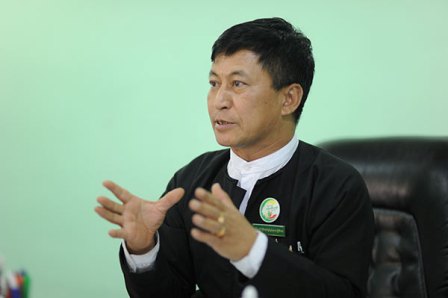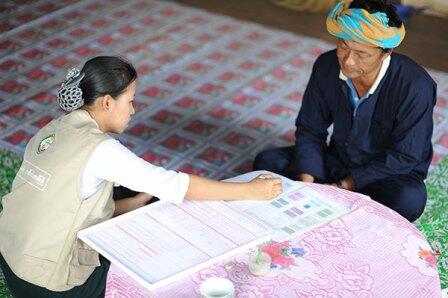U Kay Pha is a member of the Pa-O ethnic group (also known as the Taungthu or Black Karen), easily recognized by their traditional dark outfits and colourful headgear. Some 9,000 Pa-O live in Naung Kon, which sits at the foot the Shan Mountains, not far from Myanmar’s famous landmark, Inle Lake. The village is part of the Pa-O Self-Administered Zone within Shan State.
Daw Nan Aye Aye Nyunt, a 26-year-old primary schoolteacher, came to U Kay Pha’s home to interview him about his family size and economic status. She was one of 160 enumerators carrying out the 2014 Myanmar census in the village. Between 30 March and 10 April, she was expected to enumerate 110 households.

“Prior to the census I visited all the households to tell people about the census and to let them know when I would be coming to enumerate them,” she said. U Kay Pha had heard radio announcements about the upcoming exercise before she came.
Though her ethnicity is Shan and not Pa-O, she lives in the village and speaks the Pa-O language. “Most of the households in my area are Pa-O. If the head of household is Pa-O, I conduct the enumeration using their language.”
In Hopong, capital of the Pa-O Self-Administered Zone, the zone’s Chairman, U Khum San Lwin, said that accurate data generated from the census would be critical in steering Myanmar’s political, economic and social development.
“The only data we have is based on unreliable projections,” he stated in an interview. “Only when we have the correct statistics, will we truly know the nation’s needs and be able to build what is required, with appropriate technology and investment from the international community. As our nation is starting her journey towards democracy, economic development is vital.”
U Khum San Lwin noted that completing the census enumeration in the self-administered zone might run a few days behind schedule because of challenges in reaching some remote locations.
The estimated 600,000 Pa-O living Shan State constitute the state’s second largest ethnic group, after the Shan.


